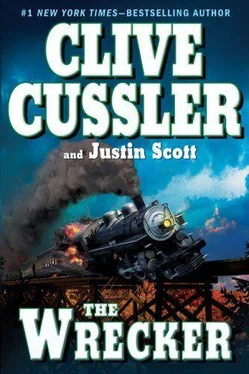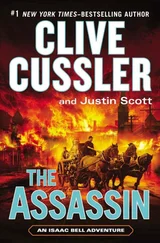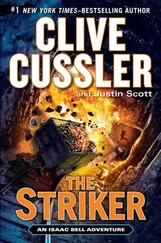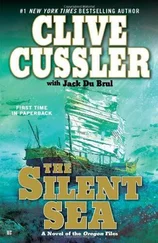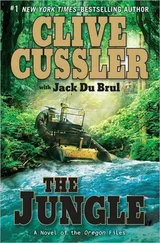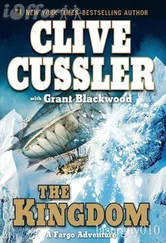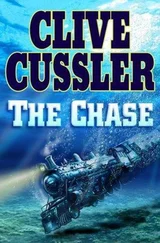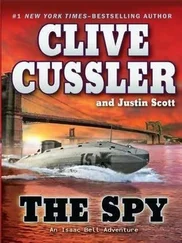“Mr. Mowery?” Lillian purred through clenched teeth. “What color would you like your rocking chair painted?”
“You don’t understand, little lady!”
“I understand the difference between giving up and fighting back.”
Mowery stared at the carpet.
“Answer my father!” Lillian demanded. “Is there any chance of shoring those piers before they collapse?”
Mowery blinked. He tugged a sail-sized handkerchief from his pocket and dabbed his eyes.
“We could try building flow deflectors,” he said.
“How?”
“Spur dikes off the bank. Harden the bank with riprap. And riprap upstream and downstream of the piers. The same riprapping that double-crossing little bas-was supposed to install properly. We might try collar plates, I suppose.” He picked up a pencil and half heartedly drew a sketch of flow deflectors steering the river currents around the piers.
“But that’s only short-term,” Hennessy countered gloomily. “‘Til the first flood. What about long-term?”
“Long-term, we would somehow have to try to extend the depth of the pier footings. Straight to bedrock, if we can locate it. But at least below the depth of streambed scour.”
“But the piers are already in place,” groaned Hennessy.
“I know.” Mowery looked over at Lillian. “You see, Miss Lillian, we’d have to sink all new caissons for the sandhogs to excavate”-he drew a picture showing the base of the piers surrounded by watertight chambers in which men could work beneath the river-“but before we could even start sinking caissons we’d have to erect coffer dams, temporary protection around the piers to keep the river out, here and here. See? We haven’t the time.”
He dropped the pencil and reached for his walking stick.
Before Mowery could stand, Bell leaned over him and put his fin ger firmly on the sketch.
“These coffer dams look like those collar plates. Could coffer dams deflect flow?”
“Of course!” Mowery snapped. “But the point-”
The old engineer’s voice trailed off midsentence. He stared. Then his eyes began to gleam. He pushed his walking stick aside and snapped up a pencil.
Isaac Bell shoved a fresh sheet of paper toward him.
Mowery scribbled frantically.
“Look here, Osgood! To the devil with short-term. We’ll build the caissons straight off. Shape their coffer dams to function as flow deflectors, too. Better than collar plates, when you think about it.”
“How long?” asked Hennessy.
“At least two weeks, round-the-clock, to put the coffer dams in place. Maybe three.”
“Weather’s getting worse.”
“I’ll need every hand you can spare.”
“I’ve got a thousand in the yard with nothing to do.”
“We’ll riprap here and here, harden the bank.”
“Just pray we don’t get a flood.”
“Extend this spur deflector . . .”
Neither the bridge builder nor the railroad president noticed when Isaac Bell and Lillian Hennessy retreated silently from what had blossomed into a full-fledged engineering conference.
“Nice work, Lillian,” Bell said. “You stirred them up.”
“I realized I had better insure my financial future if I’m going to be courted by a penniless detective.”
“Would you like that?”
“I think I would, Isaac.”
“More than a candidate for president.”
“Something tells me it would be more exciting.”
“In that case, I’ve got good news for you: I’ve wired Archie to come take over for me.”
“Archie’s coming here?” She seized Bell’s hands in hers. “Oh, Isaac, thank you. That’s wonderful.”
Bell’s golden mustache fanned open with his first carefree smile since they discovered the catastrophe of the sabotaged piers.
“You must promise not to distract him too much. We still haven’t caught the Wrecker.”
“But if Archie is taking over here, where are you going?”
“Wall Street.”
ISAAC BELL RACED ACROSS THE CONTINENT IN FOUR AND A HALF days. He took limited flyers when he could and chartered specials when the trains ran slow. He made the final eighteen-hour dash on the Broadway Limited, proudly named for the broad, four-tracked roadbed between Chicago and New York.
On the ferry to Manhattan, he saw how quickly Jersey City and the railroads were repairing the damage from the Wrecker’s dynamite explosion. The station roof was already replaced, and a new pier was rising where less than three weeks ago he had seen the blackened stumps of pilings submerged by the tide. The wrecked ships were gone, and while many windows were still covered with raw boards many more gleamed with new glass. The sight filled him with hope at first, reminding him that back in the Oregon Cascades Hennessy and Mowery were driving round-the-clock work gangs to save the Cascade Canyon Bridge. But, he admitted soberly, their task was vastly more difficult, if not downright impossible. The bridge’s very foundations were sabotaged. And the Wrecker was still at large, determined to wreak more damage.
Bell disembarked at Liberty Street and walked quickly to nearby Wall Street. On the corner of Broad stood the white marble headquarters of J. P. Morgan amp; Company.
“Isaac Bell to see Mr. Morgan.”
“Do you have an appointment?”
Bell opened his gold watch. “Mr. Joseph Van Dorn arranged our meeting for ten this morning. Your clock is slow.”
“Oh yes, of course, Mr. Bell. Sadly, however, Mr. Morgan had an abrupt change of plans. He is on the boat to England.”
“Who did he leave in his place?”
“Well, no one can take his place, but there is a gentleman who might be able to help you. Mr. Brooks.”
A messenger boy led Bell into the bowels of the building. He sat for nearly an hour in Brooks’s waiting room, which offered a view of a nickel-clad, steel-barred vault guarded by two armed men. He passed the time by working out the details of two foolproof robberies, a day job and a night job. Finally, he was ushered into Brooks’s office.
Brooks was short, compact, and curt. He greeted Bell irritably, without apology for keeping him waiting.
“Your meeting with Mr. Morgan was arranged without my knowledge. I’ve been instructed to answer your queries. I am a very busy man, and I cannot imagine what information I can impart to a detective.”
“I have one simple question,” said Bell. “Who would gain if the Southern Pacific Railroad Company went bankrupt?”
Brooks’s eyes gleamed with predatory interest.
“Do you have information to support that inference?”
“I infer nothing,” Bell retorted sternly before inadvertently injecting a fresh element into the endless battle to consolidate the railroads, and undermining Hennessy’s reputation in the marketplace. “I am asking who would gain if that event were to occur?”
“Let me get this straight, Detective. You have no information that Osgood Hennessy is in a weakened position?”
“Absolutely none.”
The interest slid out of Brooks’s eyes.
“Of course not,” he said sullenly. “Hennessy has been impregnable for thirty years.”
“If he were not-”
“If! If! If! Banking is not a business of ifs, Mr.”-he pretended to glance at Bell’s card as if to jog his memory-“Bell. Banking is a business of facts. Bankers do not speculate. Bankers act upon certainties. Hennessy speculates. Hennessy blunders ahead.”
“And yet,” Bell said mildly, “you say that Hennessy is impregnable.”
“He is crafty.”
Bell saw he was wasting his time. Closemouthed, and angling for profit, bankers like this one would give nothing to a stranger.
Brooks stood up abruptly. He stared down his nose at Bell, and said, “Frankly, I don’t understand why Mr. Morgan would waste his time answering a detective’s questions. I suppose it is another example of his overly kind nature.”
Читать дальше
